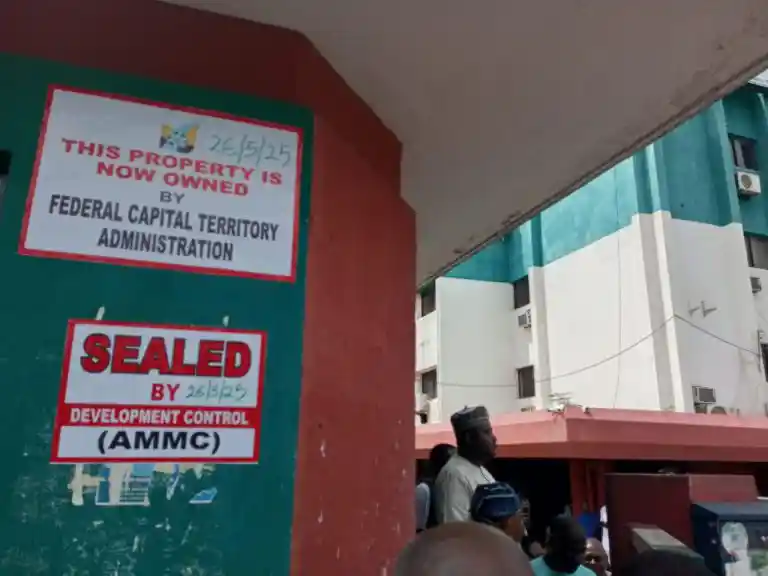Breaking: FCTA Seals Off PDP National Headquarters in Abuja
- Advertisement -
In a dramatic turn of events on Monday afternoon, the Federal Capital Territory Administration (FCTA) sealed off the national secretariat of the Peoples Democratic Party (PDP) located in the Wuse district of Abuja. The move was part of the ongoing enforcement drive over revoked properties due to unpaid ground rent obligations.
How the PDP Office Was Sealed
According to eyewitnesses, the operation began around 2:05 PM when FCTA officials stormed the PDP national headquarters. They demanded to speak with the building’s management, but before any meaningful engagement could occur, the premises were sealed.
Following a brief protest and back-and-forth between the officials and on-site staff, the building was temporarily unsealed—strictly to allow employees to remove personal belongings and vehicles. After this window, the building was locked down again.
- Advertisement -
The Bigger Crackdown: Over 4,700 Properties Affected
This action comes just days after the FCTA publicly announced plans to take possession of 4,794 properties across Abuja’s highbrow areas, including:
- Central Area
- Garki I and II
- Wuse I and II
- Asokoro
- Maitama
- Guzape
These properties, the administration said, had failed to meet their ground rent obligations—some for as long as 43 years.
Legal Position and FCTA’s Defense
During a press briefing last week, Lere Olayinka, Senior Special Assistant on Public Communications to the FCT Minister, alongside Director of Lands, Chijioke Nwankwoeze, and Director of Development Control, Mukhtar Galadima, emphasized that the law was on their side.
- Advertisement -
“Ownership of the revoked 4,794 properties has reverted to the FCTA. Starting Monday, the government will begin exercising its rights of ownership over the affected lands,” said Nwankwoeze.
Addressing potential legal hurdles, the Director stated categorically that no court injunction currently prevents the FCTA from carrying out its mandate. He added that all actions are in accordance with existing laws and regulations governing land administration in the FCT.
FCTA’s Long-Term Enforcement Strategy
Officials confirmed that they are compiling a compliance database of all property title holders still in default—some of whom were previously granted a 21-day grace period to settle arrears.
- Advertisement -
“Once these records are complete and analyzed, we will proceed accordingly,” Nwankwoeze stated, reaffirming the FCTA’s zero-tolerance policy toward land use violations and rent evasion.
The Director of Development Control added that access to sealed properties will remain restricted until further notice, and future decisions on the use or redevelopment of such properties would be communicated in due course.
Political Implications for PDP
While the FCTA insists that the move is strictly administrative and not politically motivated, sealing off the national secretariat of one of Nigeria’s major political parties—particularly in the lead-up to internal party reforms and the 2027 general elections—could trigger political backlash and deepen perceptions of state overreach.
As of press time, PDP leaders had yet to release an official statement regarding the development.
Background: Why This Matters
The FCTA’s sweeping land recovery effort stems from a comprehensive audit that revealed over 8,000 property owners in default—many for decades. The administration said the non-payment has significantly hampered development planning and revenue generation in the capital city.
- Advertisement -
By targeting even prominent organizations and high-profile individuals, the FCTA is sending a clear message: no one is above the law when it comes to public land use.
What’s Next?
- The FCTA is expected to intensify enforcement in the coming weeks.
- Additional properties, including private businesses and residences, could face similar sanctions.
- Legal battles may ensue, especially from high-profile title holders.
- PDP is likely to respond publicly and may seek judicial intervention.
Editor’s Note
The sealing of the PDP headquarters by the FCTA marks a significant escalation in the administration’s clampdown on land rent defaulters. While legal and political repercussions are likely to follow, the FCTA appears resolute in enforcing compliance across all sectors, regardless of status or affiliation.
- Advertisement -


